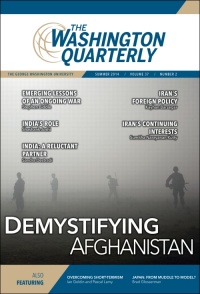Difference between revisions of "Washington Quarterly"
(Created page with "Washington Quarterly is an academic journal of global affairs that analyzes strategic security challenges, changes, and their public policy implications. <ref> [http://www...") |
|||
| (9 intermediate revisions by the same user not shown) | |||
| Line 1: | Line 1: | ||
| − | [[Washington Quarterly]] is an academic journal of global affairs that analyzes strategic security challenges, changes, and their public policy implications. <ref> [http://www.tandfonline.com/action/journalInformation?show=aimsScope&journalCode=rwaq20 Aims and Scope, Washington Quarterly] ''Taylor & Francis Online'', accessed 2 December 2014 </ref> | + | [[File:The Washington Quarterly.jpg|200px|thumb|right|Washington Quarterly]] |
| + | [[Washington Quarterly]] (ISSN 0163-660X) is an academic journal of global affairs that 'analyzes strategic security challenges, changes, and their public policy implications.' <ref> [http://www.tandfonline.com/action/journalInformation?show=aimsScope&journalCode=rwaq20 Aims and Scope, Washington Quarterly] ''Taylor & Francis Online'', accessed 2 December 2014 </ref> | ||
| + | |||
| + | The Washington Quarterly is the [[Center for Strategic and International Studies]] (CSIS) flagship journal. CSIS is one of the world’s preeminent international policy institutions focused on defense and security; regional stability; and transnational challenges ranging from energy and climate to global development and economic integration. <ref> [http://csis.org/about-us About Us] ''Center for Strategic and International Studies'', accessed 3 December 2014 </ref> The Journal therefore helps CSIS to promote these policy areas to a wide range of readers. | ||
The Journal addresses topics such as: | The Journal addresses topics such as: | ||
| Line 6: | Line 9: | ||
*Nuclear proliferation challenges including Iran and North Korea | *Nuclear proliferation challenges including Iran and North Korea | ||
*Pivotal states such as Pakistan and Turkey | *Pivotal states such as Pakistan and Turkey | ||
| − | *The continuing implications of the Arab uprisings in Egypt, Syria | + | *The continuing implications of the Arab uprisings in Egypt, Syria and beyond. |
| − | The Journal was first published in 1978. | + | The Journal was first published in 1978 and is published by [[Abingdon MIT Press Journals]]. |
==People== | ==People== | ||
| − | ===Editor in Chief=== | + | ===Circa 2014=== |
| + | ====Editor in Chief==== | ||
*[[Alexander TJ Lennon]] | *[[Alexander TJ Lennon]] | ||
| − | ===Assistant Editor=== | + | ====Assistant Editor==== |
*[[Aftan Snyder]] | *[[Aftan Snyder]] | ||
| − | ===Editorial Board=== | + | ====Editorial Board==== |
*[[Daniel Byman]] | *[[Daniel Byman]] | ||
*[[Alexandra de Hoop Scheffer]] | *[[Alexandra de Hoop Scheffer]] | ||
Latest revision as of 12:40, 8 January 2015
Washington Quarterly (ISSN 0163-660X) is an academic journal of global affairs that 'analyzes strategic security challenges, changes, and their public policy implications.' [1]
The Washington Quarterly is the Center for Strategic and International Studies (CSIS) flagship journal. CSIS is one of the world’s preeminent international policy institutions focused on defense and security; regional stability; and transnational challenges ranging from energy and climate to global development and economic integration. [2] The Journal therefore helps CSIS to promote these policy areas to a wide range of readers.
The Journal addresses topics such as:
- The U.S. role in the world
- Rising powers such as China and India
- Nuclear proliferation challenges including Iran and North Korea
- Pivotal states such as Pakistan and Turkey
- The continuing implications of the Arab uprisings in Egypt, Syria and beyond.
The Journal was first published in 1978 and is published by Abingdon MIT Press Journals.
Contents
People
Circa 2014
Editor in Chief
Assistant Editor
Editorial Board
- Daniel Byman
- Alexandra de Hoop Scheffer
- Peter D. Feaver
- Stephen J. Flanagan
- Lawrence Freedman
- Yoichi Funabashi
- Michael J. Green
- G. John Ikenberry
- Bruce W. Jentleson
- Stephen D. Krasner
- Walter Lacquer
- C. Raja Mohan
- Robin Niblett
- Joseph S. Nye Jr.
- Vladimir A. Orlov
- Meghan L. O'Sullivan
- Mitchell B. Reiss
- Simon Serfaty
- Anne-Marie Slaughter
- Constanze Stelzenmuller
- Ashley J. Tellis
- Bruno Tertrais
- Dmitri Trenin
- Wu Xinbo
- Fareed Zakaria
Contact
- Website: http://www.tandfonline.com/action/journalInformation?show=editorialBoard&journalCode=rwaq20
Notes
- ↑ Aims and Scope, Washington Quarterly Taylor & Francis Online, accessed 2 December 2014
- ↑ About Us Center for Strategic and International Studies, accessed 3 December 2014
